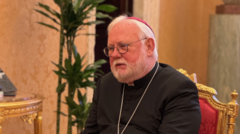Pope Francis, the historic first Latin American pontiff, passed away recently at 88 after battling health issues, including a serious bout of double pneumonia. Despite the recommendations for him to slow down, the Pope insisted on continuing his work, motivated by a strong desire to support the less fortunate. Archbishop Paul Gallagher, who has served as the Vatican's foreign minister since 2014 and closely worked with the Pope, spoke to the BBC about the late leader's refusal to step back during his final years.
Archbishop Gallagher depicted Pope Francis as a polite and caring individual, though notably resilient and firm in his convictions. "He chose not to shy away from hard truths," Gallagher said, highlighting the Pope's courageous approach to difficult issues—an admirable quality, albeit one that he did not always agree with.
The Archbishop emphasized that, throughout his papacy, the Pope felt compelled to champion those without power. Gallagher shared how the Pope frequently expressed concern for migrants, women, and children caught in global conflicts. He passionately believed that he could make a difference in alleviating their suffering, which drove him to maintain a rigorous schedule, even when it had been decades since his last vacation.
Pope Francis' journey as a leader began with a trip to Lampedusa in Italy, focusing on migrant issues. His travels spanned more than 60 countries, showcasing his dedication to advocating for marginalized voices, often disregarding caution from his advisors. The Archbishop recounted times when the Pope insisted on visiting places deemed too risky, including the Central African Republic in 2015, underscoring his commitment to popes’ mission.
Despite occasional public displays of fatigue during official engagements, Gallagher noted that the Pope thrived in the company of ordinary people, particularly the youth, rather than high-ranking dignitaries. The Archbishop regarded the Pope's legacy as multifaceted, primarily marked by breaking down barriers between the Church and its followers while showcasing his approachable nature.
Gallagher fondly recalled the Pope encouraging him to keep a sense of humor, a testament to the warmth between them. As the Vatican prepared for the Pope's funeral, over 250,000 mourners paid their respects. The Archbishop’s reflections encapsulate the essence of Pope Francis' life—a leader who continually strove to uplift the marginalized until the very end.





















